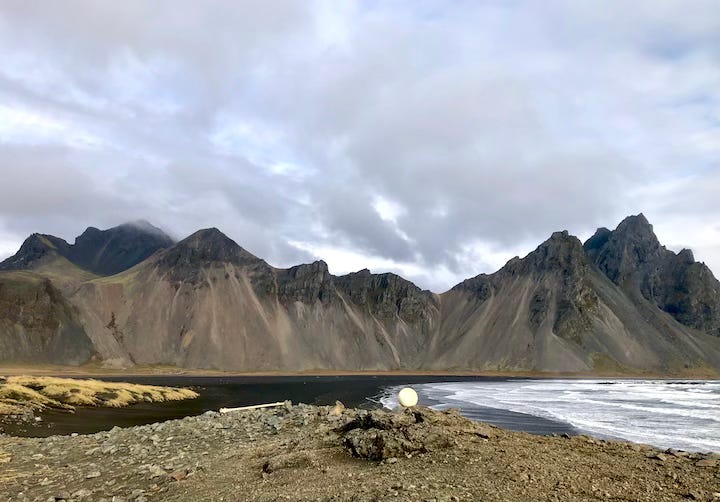A short dispatch from... Vestrahorn
A love affair, a writer, a mountain, and ten millions years of slow cooling
He called it a love affair. He was wistful, a little boastful even. He told me that he was a young man at the time, a student. She was older, more experienced. It was beautiful and it was passionate and it was all he could have hoped for.
He said, It’s not something I’ll ever forget.
How could you be expected to? I asked.
This was at a campground on the southeast coast of Iceland. My wife and I were heading back from a trip around the Eastfjords in a campervan. We had seen some reindeer earlier. My wife was ecstatic. At the start of our trip, she told me that all she wanted was to see seals and reindeer. I made no promises. But after we saw both, I wished I had.
The guy at the campground asked me where I was from and when I said Canada, he said, Oh, Leonard Cohen.
Yes, I said, Leonard Cohen.
So long, Marianne, he said.
Yes, I said. So long, Marianne.
He was from Iceland but had lived in Canada many years ago to attend university. That’s where the love affair happened.
Over his shoulder, I could see greenish-black Vestrahorn mountain in the distance, a mountain that we somehow know is ten million years old. Its outline is jagged; its slopes are steep and treeless. It’s a beautiful mountain—especially if you are someone who finds mountains beautiful. Which I do. It is also somewhat forbidding—which has its own appeal. Unlike the more typical basalt and rhyolite mountains found in Iceland, Vestrahorn is a less common gabbro mountain. Gabbro is formed by the slow cooling of magma. Ten million years of slow cooling, I guess. I once spent a windy morning on the shore near the foot of Vestrahorn. The wind blew sand in my face and in my mouth. I ate an apple afterwards and could feel, with each bite, the grit on my teeth. For months afterwards, I found black sand in the pockets of my jacket. But I didn’t mind any of that.
I am told that Vestrahorn translates to West Mountain, due to its proximity to the similar Eystrahorn, or East Mountain. I don’t know how Eystrahorn got its name.
The man at the campground asked me for how long I’d been in Iceland. I told him it had been over a month, that I’d been working on a book in a small town in the northwest. My wife, I said, indicating my wife sitting in our nearby campervan, came to meet me for a short holiday before we both head home.
She was a writer, he said.
My wife? I asked, not understanding.
No, he said, the woman I had the love affair with. She was a writer.
A Canadian writer? I asked, because I know a lot of Canadian writers.
Not exactly, he said, and then he told me where she was from.
I said the writer’s name. I didn’t even have to think about it.
You know her? he asked, incredulous.
I’ve read her books, I said. In fact, I read her most recently published book just days before I came here to Iceland. She’s very good, I said.
He nodded dreamily.
I learned a lot from her, he said. And he told me some of what he learned.
After a while, he motioned to my wife sitting in the van.
She’s waiting for you, he said.
Oh, don’t worry about her, I said. She’ll understand.
I wanted to hear more about this love affair. So he told me more.
He told me that he was proud of the love affair—that it had happened, that it was something he got to experience. It was passionate, he said, and it made him feel alive. He had no regrets because it shaped him and made him the man he was today.
Do you miss her? I asked.
He looked past me as he thought about his answer.
No, he said, after a long pause. At least I don’t think so.
But he said that he remembered her fondly, lovingly. He thought of her every so often. Something would trigger it. A certain smell, the glimpse in a crowd of a woman who bore even the slightest resemblance to her. Some days all it took was a single word to conjure her memory.
Have you read her books? I asked.
No, he said, not yet. But I will. One of these days. When I’m ready, he said.
When you’re ready, I said, nodding because I understood.
He told me that it was a good time in his life.
And now is also a good time in my life, he said, gesturing all around him.
We were both quiet then and looked out past the campground at Vestrahorn in the distance. It was late but because it was June the sun wouldn’t be going down for couple hours. We cast long shadows in the grass. The air was cool and warm at the same time. It felt nice on my face.
After a minute or so, he turned to look at me and he said, Go to your wife. And then he said, smiling, So long, Marianne.


Oh don’t worry about her. She’s fine. Lol.